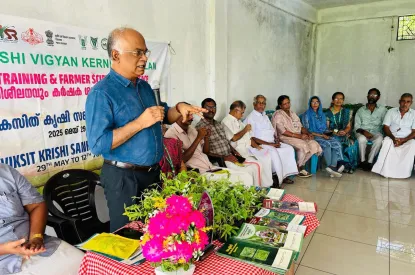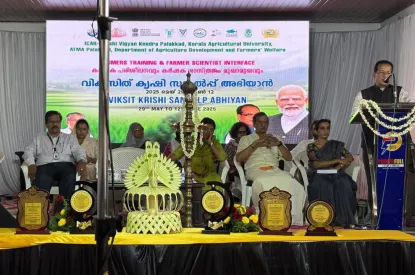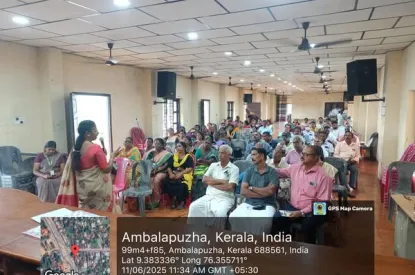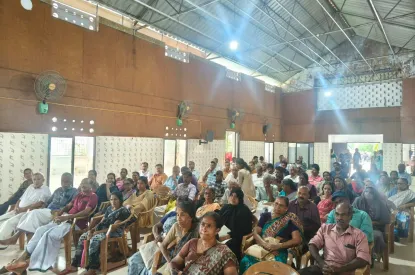Vikasit Krishi Sankalp Abhiyan programme by ICAR CTCRI
As a visionary mission to create a self-reliant and sustainable India by our Honourable Prime Minister, the Union Minister of Agriculture and Farmers’ Welfare, Shri Shivraj Singh Chouhan, launched the Viksit Krishi Sankalp Abhiyan (VKSA-2025) at the ICAR-Central Institute of Freshwater Aquaculture (ICAR-CIFA), Kausalyaganga, Bhubaneswar, Odisha, on 29 May 2025. The Viksit Krishi Sankalp Abhiyan is a nationwide campaign launched to modernize Indian agriculture through scientific outreach, sustainable practices, and farmer empowerment. It is a significant nationwide initiative launched by the Government of India, primarily led by the Ministry of Agriculture and Farmers' Welfare in collaboration with the Indian Council of Agricultural Research (ICAR). It aims to modernize Indian agriculture, empower farmers, and contribute to the vision of a "Viksit Bharat" (Developed India) by 2047. Its aim is to cover over 65,000 villages across 723 districts and to directly engage more than 1.3 crore farmers, fostering the adoption of scientific farming practices and promoting sustainable agricultural growth. It aligns with the vision of making India the “Food Basket of the World” through science-backed, climate-resilient, and farmer-centric agriculture.The programme was scheduled from May 29, 2025 to June 12, 2025. It is planned to be conducted biannually before the Kharif and Rabi sowing seasons.
Participation by the ICAR-CTCRI scientists
During the VKSA, the Director and scientists of ICAR-CTCRI participated in various programmes organized across different districts in Kerala. The programme was undertaken in collaboration with ICAR-ATARI, Bengaluru, Krishi Vigyan Kendras, and state line departments. Twenty five scientists from the Institute were deputed to fourteen districts in Kerala. Dr. G. Byju, Director, ICAR-CTCRI participated in the campaign at KVK Ernakulam and KVK Alapuzha. He also interacted with the farmers and briefed about the technologies developed by the Institute. The entire team of scientists, KVKs staff and the state department officials covered 1163 villages across 14 districts, reaching out to a total of 256517 farmers, of which 37% were female and 63% male. The programme also witnessed the participation of several dignitaries, Honourable Minister of State for Petroleum and Natural Gas and the Minister of Tourism, the DDG (Animal Sciences), ICAR, New Delhi, Director, ICAR-ATARI, Bengaluru, Director, ICAR-CIFT, and ICAR-CMFRI, Ernakulam, Dean of Faculty (Agriculture), KAU, Assistant Director of Agriculture, Agriculture Officers, Block Panchayat President, Ward councilors, members and other people representatives. Scientists delivered technical talks on different topics. They also interacted with farmers and identified their problems and provided real-time field solutions and recommendations. Daily feedback reports from farmers were submitted to the concerned authorities.
Key activities conducted at the villages:
Conducted awareness classes on tuber crops, rice cultivation, integrated pest and disease management; Farmer–scientist interaction sessions on crop production and bio-inputs; sustainable cultivation and climate-resilient technologies; intercropping of tubers in coconut gardens, monsoon care in livestock, and soil testing; sessions on cardamom, banana, fish farming, and rain-fed crop management; dissemination on nutrient and pest management in vegetables and tubers; integrated crop management (vegetables, banana, and plantation crops; integrated farming and technology packages; coconut, arecanut, spices, and ornamental fish farming; value addition and sustainable pest control methods; tropical tuber crops, spices, inland fish farming, and processing technologies etc. .In addition to this planting materials of tuber crops were given to the farmers and demonstrations were organised in their fields along with exhibitions.
Researchable issues in tuber crops
Enhancement of shelf life of tuber cassava for better market price
Nutrient rich value added products from tuber crops
Management of cassava root rot
Boron management in cassava
Production of disease free quality planting materials of cassava
Varieties resistant to weevil in sweet potato
Effect of trailing in sweet potato for improved tuberization
Short duration cassava varieties Integrated management for Mealy bug, scale and stem and root rot in cassava and collar rot in elephant foot yam
Eco friendly management of weeds in tuber crops
Small implements like weeder, starch extraction machines, etc.
Need for high yielding pest and disease resistant and climate resilient varieties
Low cost eco friendly pesticides and fertilizers for tuber crops
Nutritional and shelf life potential of arrow root powder made directly through slicing, drying and grinding over traditional method
Development of equipments for small scale (quantity) application of pesticides suited to specific situations (homestead gardens).
Identification of duration of a variety after cutting the stem while in the field
Short statured cassava varieties with good stem thickness to withstand heavy wind and rain
Method to diagnose corm rot on harvest well in advance while the crop is in the field
Scientific methods for the control of wild boar and rat menace in cassava cultivation
Short duration cassava varieties with bitter taste
Smart farming practices in tuber crops to enhance profitability and efficiency in agriculture
Setting up of cassava-based industries in Kerala was proposed to encourage and support cassava cultivation in the state.









